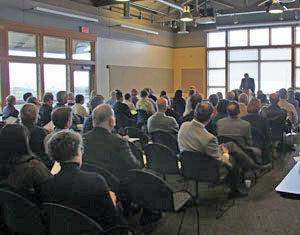Three California legislators joined Chancellor Blumenthal and other senior administrators and academic leaders January 22 at the Seymour Marine Discovery Center to discuss the fiscal emergency facing the state budget and public higher education.
State Sen. Joe Simitian, D-Palo Alto, and Assemblymembers Bill Monning, D-Monterey, and Ira Ruskin, D-Mountain View - all UC Berkeley grads, they noted - acknowledged the prospect of another $20 billion deficit facing California and the difficulty in getting any budget with new taxes passed with the requisite two-thirds majority.
But all agreed with moderator John Laird, a UC Santa Cruz grad, current lecturer and former chair of the Assembly Budget Committee that the legislature and governor must make higher education a priority for funding. "It's a matter of utmost importance," Laird said.
Also attending the forum sponsored by UC Santa Cruz, the Santa Cruz Area Chamber of Commerce, and Santa Cruz Next were Brian King, president of Cabrillo College, Kathy Cruz-Uribe, provost of California State University, Monterey Bay, local business leaders, the five UCSC deans, and several academic department chairs.
Referring to Gov. Arnold Schwarzenegger's recent pronouncements that higher education deserves a greater proportion of state revenue than prisons, Blumenthal said he was "heartened that the conversation is shifting from despair to hope and aspiration."
The forum "demonstrated how we can all work together toward the dream of quality and accessible higher education for all Californians," he said.
Administrators, faculty, and students described the impacts on UC Santa Cruz of more than $50 million in budget cuts over a two-year period. Speaking for the faculty, History Department chair Mark Traugott described how he must manage a department with "the same number of students and fewer faculty."
History has lost four professors to retirement whom he cannot replace, Traugott said. The four happen to be in European history, cutting that specialty in half.
Several other senior faculty echoed Traugott's concerns about the prospect of losing faculty as pay and benefits further lag other universities.
Undergraduate Matthew Palm and graduate student Chelsey Juarez described the difficulty getting into classes and the effects of steep tuition increases. Juarez said some graduate students were having to suspend their studies. "Graduate students are the people power we need to protect," she said.
The legislators didn't need much convincing. When it was their turn to talk, each described the transformative effects that a UC education had on them. It "gave me the opportunity to become a state senator and represent 950,000 Californians," said Simitian, whose district includes UCSC.
Ruskin, who co-chairs the Joint Committee on the Master Plan of Higher Education, said he was encouraged that a conversation is "taking place for the first time in a long time to explain the necessity of higher education for the prosperity of California."
Monning said education at all levels is the third largest employer in his district that encompasses Santa Cruz and the Monterey Bay Area. "Fundamentally, there are two questions," he said. "What kind of state do we want? Who pays, and what is the price tag?"
The governor's most recent budget restores about $370 million to UC, but does not account for accelerating costs. A revised budget is expected in mid-May.




